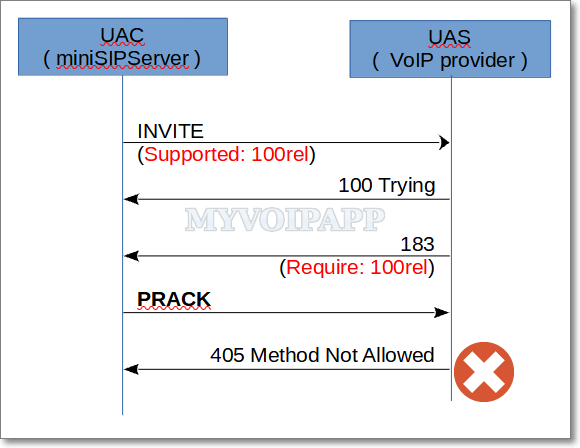Reliability of Provisional Responses
As we know, RFC3262 defines SIP reliability of provisional responses. It is an old feature and miniSIPServer ( both local versions and cloud versions) can support it for a long time. When working with traditional telcom carriers, this feature is mandatory, that means carriers will reject all incoming calls if they cannot support reliability of provisional responses.
RFC3262 defines a “100rel” parameter to indicate reliability of provisional responses, so we call it “100rel” capability. In normal, when invoking a call, the caller should make itself clearly that it can support “100rel” capability, and of course, the callee side should also make itself clearly that it requires to use “100rel” capability.
In the RFC3262, we can get following details:
…… the initial request contained a Supported or Require header field listing 100rel, and that there is a provisional response to be sent reliably. ……
UAS core … MUST contain a Require header field containing the option tag 100rel, and MUST include an RSeq header field.
Then both sides can establish reliability of provisional responses. Above figure describes the basic call flow. When UAC receives a 18x message which is a provisional response, UAC should send a PRACK message back to tell UAS that UAC has received its 18x message.
This is not a complex call procedure. We thought it wasn’t until several days ago. One of our cloud miniSIPServer customers reported he cannot make calls out. Then we traced his calls and get following call flow described below.
Unbelievable …… this voip provider requires “100rel” in its 183 messages, but once miniSIPServer sends PRACK messages to confirm that, it returns “405 method not allowed” to reject them, and it causes every call failed.
Why?! If it cannot accept or support PRACK messages, why does it require “100rel” in its provisional responses?
It is quite easy to fix that. Just remove its “require 100rel” from 18x messages, miniSIPServer will not send PRACK messages back. But unfortunately, the team of this voip provider doesn’t know how to do that.
Our customer is blocked and his service has to be stopped. In another way, I personally think some VoIP providers use public open source servers, such as Asterisk, FreeSwitch, and so on, to build their solutions, maybe they don’t have enough experts to understand what they built.
So we update miniSIPServer to add an option in external lines configuration to disable reliability of provisional responses. Please refer to the figure below.
If you check this item, the INVITE messages sent from miniSIPServer will not have “support 100rel” parameter. Once you meet such a ridiculous VoIP provider, you can try this.


